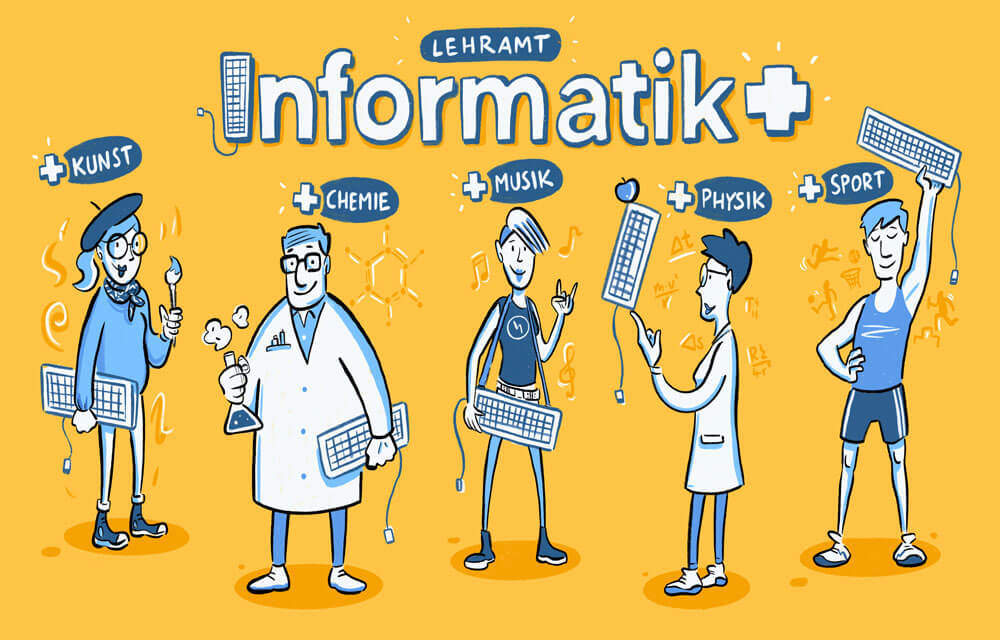Computer science for teachers can now be combined with ethics, languages and other subjects

Illustration of Lehramt Informatik PLUS ©Saarland University
Until now, it was only possible to study computer science for a teaching profession together with mathematics. Now it is possible at Saarland University to combine all school subjects with computer science. With the reform of the academic program, completely new teaching contexts for computer science topics will be opened up. This is intended to meet the demands that students are confronted with in a society increasingly shaped by technology and computer science. No previous knowledge of computer science is required to enroll.
“The students can now set their own priorities,” says Professor Verena Wolf, who is responsible for the didactics of computer science at Saarland University. “For example, they can now combine ethics and computer science, foreign languages plus computer science or artistic subjects with computer science. The digital revolution has long since arrived in all areas of life and with the rework of the course of studies we can reflect this in the teaching at our schools,” explains the computer scientist.
Recent discussions, for example on the various forms of tracing apps for tracking corona virus infections, show: “In many topics related to the digital world, you can only participate in the discussion if you understand the basic concepts behind them. That’s why computer science is already important at school, because only here can the necessary skills for responsible use of technology be taught,” explains Verena Wolf. Children and teenagers have to learn as early as possible to understand and question the technical applications they encounter on a daily basis in the digital world.
Generally, teacher training consists of the study of educational science and two other subjects. Computer science can be chosen in the teaching profession for secondary level I and II at Gymnasium or Gemeinschaftsschule and in the teaching profession for vocational schools. Both programs have a standard period of study of ten semesters each, including five school internships. A teacher training program is concluded with the Staatsexamen. The degree is followed by an 18-month preparatory training period, the Referendariat. Afterwards, the newly certified teachers engage in a highly diverse professional life in which they can teach cutting edge, relevant topics and creatively develop their teaching concepts.
Further information on the course and a trial session for people wishing to study will take place at Saarland University’s digital Tag der offenen Tür on June 27th 2020.
Questions can be directed at:
Prof. Dr. Verena Wolf
Email: wolf@cs.uni-saarland.de
Tel.: +49 (0)681 302-5586
Further Information:
https://saarland-informatics-campus.de/lehramt-informatik/
Background Saarland Informatics Campus:
800 scientists and about 2000 students from 81 nations make the Saarland Informatics Campus (SIC) one of the leading locations for computer science in Germany and Europe. Five world-renowned research institutes, namely the German Research Center for Artificial Intelligence (DFKI), the Max Planck Institute for Computer Science, the Max Planck Institute for Software Systems, the Center for Bioinformatics and the Cluster for “Multimodal Computing and Interaction” as well as Saarland University with three departments and 21 degree programs cover the entire spectrum of computer science.
Editor:
Philipp Zapf-Schramm
Competence Center Computer Science
Saarland Informatics Campus
Phone: +49 681 302-70741
E-Mail: pzapf@mmci.uni-saarland.de
Die Öffentlichkeitsarbeit am Saarland Informatics Campus wird unterstützt durch das Kompetenzzentrum Informatik Saarland, gefördert aus Mitteln des Europäischen Fonds für regionale Entwicklung (EFRE) und Mitteln der Staatskanzlei Saarland.


